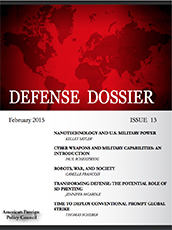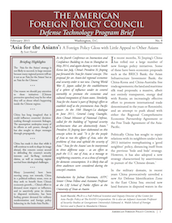China Reform Monitor: No. 1148
Change to “
One Child Policy”
means 1 million more births in 2015;
China and Argentina form “
strategic integral alliance”
Change to “
One Child Policy”
means 1 million more births in 2015;
China and Argentina form “
strategic integral alliance”
Sri Lanka: No more Chinese subs in ports;
India and Israel coope on the new SAM system;
Afghans launch largest-ever solo offensive;
India to fast-track, upgrade new carrier;
Battle rages near China-Myanmar border
There is an old piece of folk wisdom which, in light of current events, must translate neatly into Russian: "Fool me once shame on you, fool me twice shame on me."
As an already shaky second cease-fire crumbles following the Russian capture of the Ukrainian town of Debaltsevo and with Moscow's intent to also seize Mariupol, it is becoming ever clearer that Russia has no intention of keeping the peace with Ukraine — and that the Kremlin is emboldened by what it perceives to be Western weakness.
With the likes of the Islamic State's self-declared caliph, Abu Bakr al-Baghdadi, and North Korean leader Kim Jong-un in the running, the competition is stiff indeed. But it would be fair to say that Russian President Vladimir Putin currently ranks as one of the world's most dangerous men.
No economic relief in sight;
Russia's regions get emptier
Yemen's president set to resume duties;
ISIS attacks Iranian interests in Libya;
SISI calls for joint arab force to combat ISIS;
Turkey enters Syria to recover tomb remains and guards;
Yemeni rebels use increasingly brutal tactics
Russia's political opposition has been put on notice. The Feb. 27 murder of prominent opposition leader Boris Nemtsov just steps from the Kremlin marks a dramatic escalation of the Russian regime's long-running war on its opponents. Nemtsov, after all, wasn't merely a dissenting politician. He was part of the old system, having served as a deputy prime minister in the government of President Boris Yeltsin in the late 1990s. Beginning in the early 2000s, Nemtsov had moved into the political opposition, emerging as a critic of Yeltsin's successor, Vladimir Putin, and his policies. Even so, his position as a member of Yeltsin's inner circle had given him a degree of immunity from official retribution.
On Tuesday in a much anticipated speech before joint session of Congress, Israel's Prime Minister Benjamin Netanyahu again sounded the warning against Iran's nuclear ambitions and called for "a better deal" than the nuclear agreement currently being negotiated.
US may slow troop drawdown;
Israeli, Indian ministers discuss security, trade;
India to build seven warships, six subs;
New China embassy in Pakistan;
Modi visits disputed region;
Former President arrested in Maldives
Russia: a champion of European security;
Once again, Moscow is the main enemy
Help for "
strategic"
companies;
Savchenko: A symbol of the Russia-Ukraine conflict
Desperately pursuing a nuclear deal with Iran, scrapping old positions and offering new concessions at a mind-boggling pace, the Obama administration has lost sight of what this regime represents and why the United States and its allies have focused on its nuclear program to begin with.
What could the White House have been thinking? The Obama administration's recently concluded Summit on Countering Violent Extremism was a high-profile affair, bringing together key world leaders and decisionmakers on a critical topic at a critical time. But it was also punctuated by instances of stunning tone-deafness, and a profound failure to understand the dynamics of terrorism in its many forms.
To hear the White House tell it, our nagging Iranian problem might soon be a thing of the past. As the March deadline for nuclear negotiations nears, administration officials and sympathetic onlookers have become increasingly optimistic about an impending breakthrough with the Islamic Republic over its atomic ambitions.
MARRAKESH, Morocco — It's a truism of broadcast media that "If it bleeds, it leads." The field of counterterrorism functions much the same way, which is why in recent months the Islamic State terrorist group have become the overwhelming focus of Western law enforcement and intelligence. Yet an equally significant security challenge is incubating in Africa, where local conditions have sown the seeds for the next stage of global terror.
Prominent Chinese academic warns of war on intellectuals;
Russia busts major drug trafficking ring from China
Is Russia making a global comeback in spite of Western sanctions and political pressure from the United States and Europe? On the surface, it certainly seems like it.
China offers to mediate Afghan peace talks;
Musharraf: ISI worked with Taliban;
Sri Lanka to go ahead with China port deal;
Reps. Royce, Engel urge tougher measures on Pakistan;
Sirisena visits India, signs nuclear deal
A shrinking budget for Russia's media blitz;
Pentagon report: Putin has Aspberger's
Opportunity for peace in Yemen;
Egypt audio recordngs put Sisi in hot water;
UAE to resume airstrikes against ISIS;
Syria rejects foreign ground troops;
Libyan government offensive in Benghazi
Shared concerns about China bring Manila and Hanoi together;
Beijing strengthens ties with Thailand’
s military junta
China-Pakistan nuclear cooperation;
India, U.S. to cooperate on carrier technology;
Sri Lanka to go ahead with China port deal;
India enhances defenses on border with China;
Thousands nabbed in Pakistani terror crackdown
Japan augments missile radars;
An Iranian Iron Dome?;
The S-300, back on the table...;
...as Moscow eyes the Arctic;
Fear and loathing in Beijing;
Missile defense of the future
Russian military focuses on nukes and new partners;
Discrimination in Crimea
Attempts to avoid touching on religious dimension of the struggle has led to several recent high-profile administration gaffes. President Obama strangely tried to deflect the issue at the National Prayer Breakfast on Feb. 5 by mentioning the Crusades as an example of Christian excess. Unfortunately, that example is also a key jihadist talking point.
President Barack Obama said a nuclear deal with Iran is possible if Tehran truly considers nuclear weapons un-Islamic. But is this true? And does it matter?
More economic woes... and profligate spending;
Designating Russia a terror state
During his January trip to India, President Obama scored a small win for his legacy and a big win for the Indo-U.S. relationship. While the U.S. president performed admirably in front of the cameras, the most productive Indo-U.S. summit in a decade owes its success to someone else—India’s new Prime Minister Narendra Modi.
President Barack Obama ’s first public appearance with the Dalai Lama , the spiritual leader of Buddhists around the world, made headlines on Feb. 5. While the setting was an ostensibly religious occasion, the National Prayer Breakfast, China was quick to take offense. “This action by the U.S. to ‘drive a nail’ into the hearts of the Chinese people is harmful to the political trust between the two countries,” opined the state-run Xinhua news agency.
Denying Iran nuclear-weapons capability is not only a means of limiting the proliferation of weapons of mass destruction. It is also part of a broader ideological struggle that Tehran is taking much more seriously than is the United States.
New nationalist education regulations released;
Chinese shops attacked and looted in the Congo
Global financial markets currently obsess about the fate of a small Balkan country’s sovereign debt and its impact on the Eurozone. However, if the burden of Greek debt were to disappear overnight, the miracle would just reveal the underlying weakness of the Greek economy and its dependency on Europe for the foreseeable future.
Indian external affairs minister in Beijing;
Obama, Dalai Lama will meet in public for first time;
ISIS Khorasan, Pakistani Taliban form alliance;
At least 40 killed in Pakistan Shia mosque blast;
Modi appoints ambassador to U.S. as new top diplomat
Death sentence for 183 Brotherhood members;
South Sudan peace agreement;
Iraqis and Kurds aim to free Mosul;
Egyptian court ban Hamas;
Hezbollah ready for war with Israel
Beijing wants “
patriotic education”
in Hong Kong schools;
China’
s online economy more than doubles in a year
A helping hand against the Islamic state...;
...as Tehran draws a red line;
More fence-mending between Hamas, Iran;
Targeting the green movement, still;
The high price of journalism in Iran
After South Stream, energy uncertainty;
Capital will continue fleeing in 2015
China Daily advocates for overseas military bases;
Chinese think tank wants more transparency from provinces
Nuclear security unilateralism;
A helping hand against Boko Haram
Special CRM: China Cracks down on the Uighur Exodus

Nanotechnology And U.S. Military Power
Cyber Weapons And Military Capabilities: An Introduction
Robots, War, And Society
Transforming Defense: The Potential Role Of 3d Printing
Time To Deploy Conventional Prompt Global Strike
ISIS expands in South Asia;
New Afghan cabinet in jeopardy;
Clashes in Nepal over new constitution;
Unrest, extremism in Bangladesh
Listening to the President's State of the Union address last week, you might have come away convinced that, at least in the field of foreign policy, everything is coming up roses. Yet a look at the real world provides a jarring contrast to the complacency and unrealism of that speech - and of the Obama administration's policies writ large.
In Moscow, jitters about Charlie Hebdo;
Crimea's new economic reality

In recent months, Xi Jinping’s China has rolled out a large number of new foreign policy initiatives. Some of these have been economic proposals such as the BRICS Bank; the Asian Infrastructure Investment Bank; the China-Korea and China-Australia free trade agreements; the land and maritime silk road proposals; a massive, albeit not entirely transparent, energy deal with Russia; an increasingly effective effort to promote international trade denominated in the yuan or Renminbi; and an attempt to push ahead with either the Regional Comprehensive Economic Partnership Agreement or the Free Trade Agreement of the Asia-Pacific.
Back to instability in the North Caucasus;
New curbs on drivers, migrants and laborers
Taiwan flag-raising ceremony in U.S. causes stir;
China to invest heavily in nuclear submarines
China hosts Taliban delegation;
Chinese media expanding in Africa
To hear President Obama tell it, the West is winning in Ukraine. In his State of the Union Address last week, the President sounded downright triumphant in his description of the current situation in Eastern Europe. "We're upholding the principle that bigger nations can't bully the small - by opposing Russian aggression, supporting Ukraine's democracy, and reassuring our NATO allies," he insisted publicly.